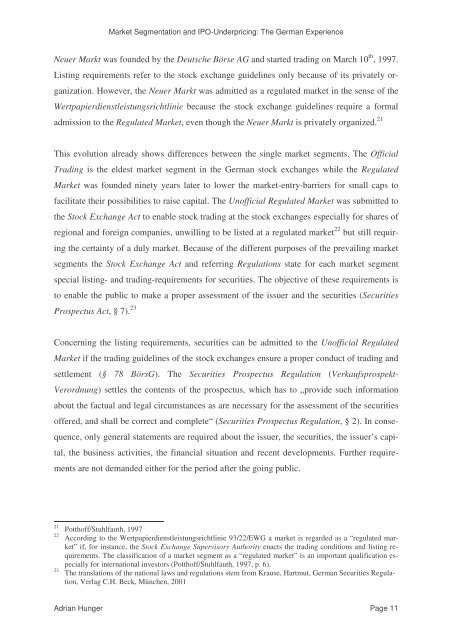Market Segmentation and IPO-Underpricing: The German Experience
Market Segmentation and IPO-Underpricing: The German Experience
Market Segmentation and IPO-Underpricing: The German Experience
Create successful ePaper yourself
Turn your PDF publications into a flip-book with our unique Google optimized e-Paper software.
<strong>Market</strong> <strong>Segmentation</strong> <strong>and</strong> <strong>IPO</strong>-<strong>Underpricing</strong>: <strong>The</strong> <strong>German</strong> <strong>Experience</strong><br />
Neuer Markt was founded by the Deutsche Börse AG <strong>and</strong> started trading on March 10 th , 1997.<br />
Listing requirements refer to the stock exchange guidelines only because of its privately or-<br />
ganization. However, the Neuer Markt was admitted as a regulated market in the sense of the<br />
Wertpapierdienstleistungsrichtlinie because the stock exchange guidelines require a formal<br />
admission to the Regulated <strong>Market</strong>, even though the Neuer Markt is privately organized. 21<br />
This evolution already shows differences between the single market segments. <strong>The</strong> Official<br />
Trading is the eldest market segment in the <strong>German</strong> stock exchanges while the Regulated<br />
<strong>Market</strong> was founded ninety years later to lower the market-entry-barriers for small caps to<br />
facilitate their possibilities to raise capital. <strong>The</strong> Unofficial Regulated <strong>Market</strong> was submitted to<br />
the Stock Exchange Act to enable stock trading at the stock exchanges especially for shares of<br />
regional <strong>and</strong> foreign companies, unwilling to be listed at a regulated market 22 but still requir-<br />
ing the certainty of a duly market. Because of the different purposes of the prevailing market<br />
segments the Stock Exchange Act <strong>and</strong> referring Regulations state for each market segment<br />
special listing- <strong>and</strong> trading-requirements for securities. <strong>The</strong> objective of these requirements is<br />
to enable the public to make a proper assessment of the issuer <strong>and</strong> the securities (Securities<br />
Prospectus Act, § 7). 23<br />
Concerning the listing requirements, securities can be admitted to the Unofficial Regulated<br />
<strong>Market</strong> if the trading guidelines of the stock exchanges ensure a proper conduct of trading <strong>and</strong><br />
settlement (§ 78 BörsG). <strong>The</strong> Securities Prospectus Regulation (Verkaufsprospekt-<br />
Verordnung) settles the contents of the prospectus, which has to „provide such information<br />
about the factual <strong>and</strong> legal circumstances as are necessary for the assessment of the securities<br />
offered, <strong>and</strong> shall be correct <strong>and</strong> complete“ (Securities Prospectus Regulation, § 2). In conse-<br />
quence, only general statements are required about the issuer, the securities, the issuer’s capi-<br />
tal, the business activities, the financial situation <strong>and</strong> recent developments. Further require-<br />
ments are not dem<strong>and</strong>ed either for the period after the going public.<br />
21 Potthoff/Stuhlfauth, 1997<br />
22 According to the Wertpapierdienstleistungsrichtlinie 93/22/EWG a market is regarded as a “regulated market”<br />
if, for instance, the Stock Exchange Supervisory Authority enacts the trading conditions <strong>and</strong> listing requirements.<br />
<strong>The</strong> classification of a market segment as a “regulated market” is an important qualification especially<br />
for international investors (Potthoff/Stuhlfauth, 1997, p. 6).<br />
23 <strong>The</strong> translations of the national laws <strong>and</strong> regulations stem from Krause, Hartmut, <strong>German</strong> Securities Regula-<br />
tion, Verlag C.H. Beck, München, 2001<br />
Adrian Hunger Page 11


